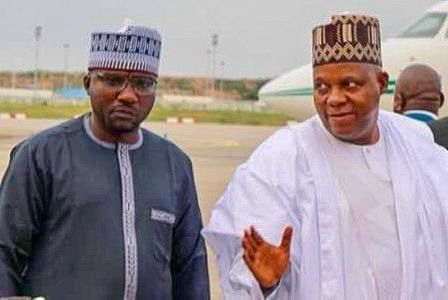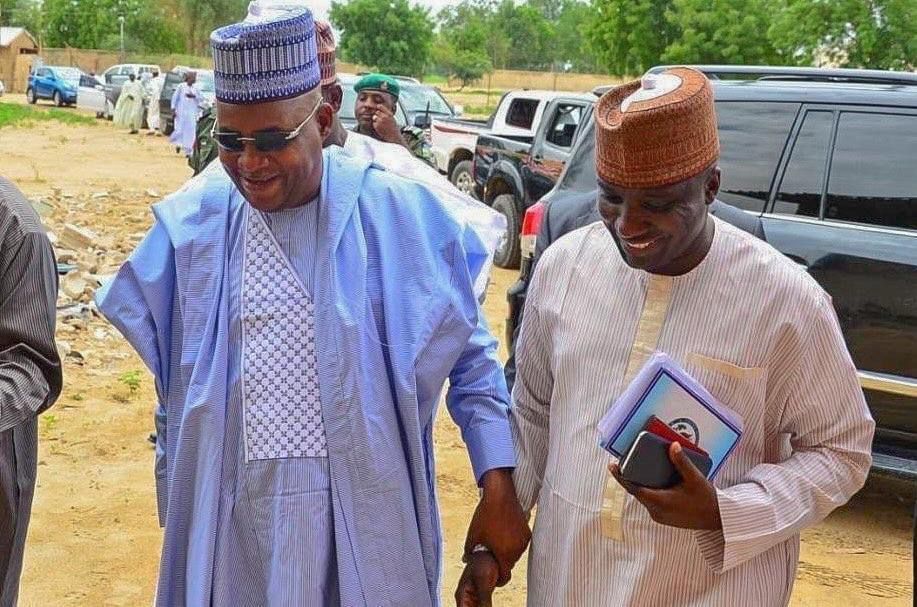By Kashim Shettima
There couldn’t have been a more poignant last chapter to a man’s life than my final text exchange with him. He reached out on December 31, 2023, to draw my attention to a Qur’an recital competition in Damaturu, Yobe State, stating that it transpired without deserving prizes. In his typical fashion, he outlined interventions that could align with the noble ambitions of the reciters and organisers. What he didn’t say this time around, while preferring the cloak he wore to redirect our concerns away from his health and towards others, was that he was on the brink of existence. He was in a hospital bed far away from home.
About a year earlier, Mallam Isa Gusau visited me at home in Abuja, and I couldn’t help but notice his sickly physical transformation. He opened up about his health struggle only when I insisted. I disagreed with his philosophy of not wanting his health to be the subject of interest in his line of work. However, he followed the direction we suggested for medical intervention and returned to prioritizing his job. With him, it’s always duty first, and that drive for excellence was once a source of trouble for us when we were on opposite sides of the table.
In 2007, when I assumed the role of Commissioner of Finance in Governor Ali Modu Sheriff’s government in Borno State, Mallam Gusau was the Daily Trust correspondent and later Bureau Chief covering the Borno-Yobe axis. He had been a problem for the government before my arrival. Fresh out of the private sector, I conducted sentiment analysis of my new station, and this inviolable reporter was a recurring problem in our efforts to manage the perception of the state and the government’s commitment to the people, especially during the critical phase of an ideological invasion in the North-East by a group that has since become the global calamity known as Boko Haram.

I had always admired objective contrarians and critics, and it didn’t take long to understand why Mallam Gusau’s journalistic overtures had been a nightmare for the government. His principles were as unyielding as ancient mountains, deeply rooted in the bedrock of his conviction as a chronicler of state affairs. I found myself compelled to acquaint with the fearless man.
Ms. Kwapchi Bata Hamman, who was then a reporter at NTA Maiduguri, became our eyes on him and eventually our bridge to him. She, along with the late Zubairu Maina Shani, a fellow Commissioner in Governor Sherrif’s government, formed our troika to untie the Gordian knot that was Isa Gusau. That one man could stir us this much, stand up to us with no fear or susceptibility to compromise, was a credential like no other. So, I knew just then that I wanted to be friends with such a man, a rebel with a noble cause.
Our destinies aligned sooner than I had expected. In 2011, when I was sworn into office as the Executive Governor of Borno State, I knew immediately that I must be surrounded by perceived trouble-makers if I were to make a difference, and Gusau easily came to mind. I was unconcerned about his origin, only what he was bringing to the table. I have always seen a leader who functions in an echo chamber as a tragedy.
Mallam Gusau agreed to be my spokesperson, testing the political divide that his path had crossed as a journalist. He mastered the art of shaping perceptions, traversing lengths unknown to me at the time. He was invested in the well-being of his colleagues and those he serves, and distinguished himself as a mediator and bridge builder in resolving office conflicts. Only many years later did I discover the depths to which he went to protect me, skilfully managing or quashing crosses without seeking the spotlight or credit.
Along with his team, he breathed life into the communication of government policies in Borno State, making us realize that even the finest idea or policy by the government is doomed to fail without strategic communications. Their legacy turned Borno State into a viable landmark on the topography of governance in Nigeria. He explored traditional and new media to dispel every attempt to caricature the state, whether in mischief or honest ignorance.

Gusau’s loyalty to friends, matched only by his competence and devotion to duty, sets him apart. This sense of responsibility led him to decline an invitation to serve as a commissioner in his home state, Zamfara, choosing instead to stay with his friends in Borno State. He played a central role among the multicultural aides that we assembled, contributing to our service to the people.
In that inclusive team of ours, where Borno State was warmly embraced as home, was Lanre Obadiah from Kwara State. Kester Ogualili and Victor Izekor were from Anambra and Abia State respectively. Christopher Godwin Akaba, an Urhobo man from Delta State, and Jack Vicent Fidelis, an Igala man from Kogi State, were also valuable members. Expanding our connections to neighboring states, Ahmed Ishaq Ningi from Bauchi State and Usman Majidadi Kumo from Gombe State were part of this dedicated ensemble.
The team was valorised by Mallam Gusau, who also served as my Special Adviser on Strategy while overseeing communications. It’s not surprising that he’s the longest-serving adviser in the history of the state. He praised your triumphs and intervened when you erred, always having the perfect books for every scenario he painted. This book-exchanging culture made him a refuge and a mirror. So, I had no speck of scepticism in recommending him for employment as an adviser to Governor Babagana Umara Zulum, whom he served for four and a half years after advising me for eight years.
Until three weeks ago, when I brought this up, Governor Zulum himself had no idea that Gusau was a leading voice advocating and justifying my choice of him as a successor. He never mentioned this to his new principal, just as he was always reluctant to divulge his health history. This lifestyle, which we opposed and came to acknowledge as the depth of his fidelity to duty, was, to him, a way to never curry favour and pity.
In a twist of fate, Isa Gusau, once perceived as a provocateur during his radical years, found himself forging unexpected alliances in a profound display of irony. Without accommodating compromises, he reconciled with those who had once deemed him a problem. The crescendo of this surprising journey was reached when he, against all odds, entered into matrimony with the sister of none other than Sen. Ali Modu Sheriff. This unexpected union not only symbolised the mellowing of Gusau’s feuds or differences with others but also cast a vivid contrast onto the canvas of his life.
What also never made the news was his philanthropy, reaching from the younger generation to the elderly. His generosity extended to the procurement of vehicles for media personnel and correspondents working in the hinterlands of Southern Borno. There was a poignant moment when he generously handed over his only vehicle to an indigent journalist colleague. I became aware of this act of kindness when I witnessed him trekking to his residence, a stone’s throw away from the Borno State Government House.
This incident invoked thoughts of Adam Grant’s acclaimed work, “Give and Take,” which categorises humanity into two reciprocity styles: Givers and Takers. Givers, characterized by their altruism, quietly assist others without seeking the spotlight, while Takers are driven by greed, desiring more than they contribute. The book celebrates legendary figures like C.J. Skender, the late Stu Inman, and George Meyer as quintessential Givers. Undoubtedly, my dear friend, Isa Umar Gusau, belongs to the distinguished category of these selfless and beautiful souls.
The void left by Gusau’s demise, as he departed from the sphere of his influence, transcends Borno State. It even extends beyond those who had feared his honesty. His loss is immense for the entire nation, which requires courageous advisors around our public office-holders, and for the humanity he served until his last breath on Thursday, January 11, 2024. May Allah repose his soul and comfort all those he left behind. Ameen.
Senator Kashim Shettima was the Executive Governor of Borno State between 2011 and 2019, and Nigeria’s current Vice President.


